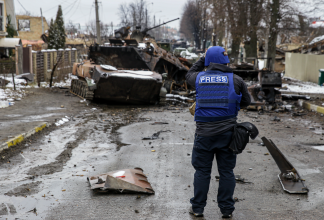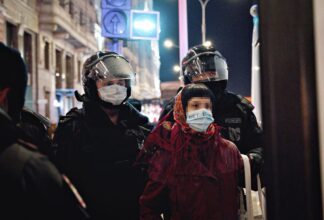Treason Law Jeopardises NGO Work
On 14 November, highly controversial amendments to the treason law, that expands the definition of treason, took effect in Russia. This happened only two days after Vladimir Putin expressed willingness to review and rethink the loose language of the legislation.
While the previous law describes treason as activities threatening Russia’s external security, the new legislation deems any activity that may threaten Russia’s “national security, constitutional order, state or territorial integrity” as high treason.
“It is hard to predict how the Russian authorities will choose to implement the law. One thing is clear though, the new law can jeopardise the work of international and Russian human rights organisations and may create fear among Russian citizens who are, in one way or another, associated with foreign organisations,” said Cecilia Rosing, Eurasia Programme Officer, Civil Rights Defenders.
In the morning of 13 November – only hours after the Russian president was quoted saying “there must be no room for a broad interpretation of treason” by local and international media — Putin signed the vaguely worded bill into a law, thus putting at risk almost any Russian citizen who associates with foreigners.
The vague new amendments to the treason law combined with the recently introduced NGO law has the potential of creating an atmosphere of fear, where any relationship with foreigners, international organisations or foreign states could be seen as high treason.
In addition to passing secret information to foreign governments, the new law makes it illegal to give or receive consultation or financial help to international organisations if they are engaged in “activities directed against the security of Russia.”
Furthermore, the mere possession of information deemed secret – even if it is not passed to a foreign state or international organisation – could result in up to eight years of imprisonment for espionage.
The law also punishes the obtaining of secret information with a fine of 200,000 to 500,000 rubles (43,000 kronor to 107,000 kronor) or imprisonment of up to four years.
Putin’s spokesperson Dmitry Peskov said Wednesday that the Russian president’s earlier statement about rethinking the language of the bill indicated his readiness to review the treason law if its implementation reveals “some problems or aspects restricting rights and freedoms” of Russian citizens, local and international media report.
The high treason law has been vigorously criticised by human rights advocates as widening crackdown on dissent after President Vladimir Putin began his third presidential term in May. Putin’s Monday statements were the first signal toward softening of hard-line politics against opposition that did fade away in only a few hours.
The law, passed by the State Duma in late October, was backed by the Federal Security Service, the main KGB successor agency known under its Russian acronym of FSB.


